Jalan Kopo
Download links and information about Jalan Kopo by SABAH HABAS MUSTAPHA. This album was released in 1998 and it belongs to World Music genres. It contains 8 tracks with total duration of 43:31 minutes.

|
|
|---|---|
| Artist: | SABAH HABAS MUSTAPHA |
| Release date: | 1998 |
| Genre: | World Music |
| Tracks: | 8 |
| Duration: | 43:31 |
| Buy it NOW at: | |
| Buy on iTunes $7.92 | |
| Buy on Amazon $14.12 | |
Tracks
[Edit]| No. | Title | Length |
|---|---|---|
| 1. | Bandung | 5:11 |
| 2. | Sumbawa | 6:26 |
| 3. | Jalan Kopo | 6:24 |
| 4. | Artur Asaki | 6:05 |
| 5. | Too Much Luggage | 2:57 |
| 6. | Waduh | 5:33 |
| 7. | Sailing Home | 5:33 |
| 8. | Habibeh | 5:22 |
Details
[Edit]Jalan Kopo is the second Indonesian outing for the man from Szegerely. Like Denpasar Moon, it's hitched in Indonesia, but grazes in other musical pastures. Not many musicians could pull this off successfully, but Mustapha and the Jugala All-Stars do. Unlike the first album, Sabah Habas was the studio maestro on Jalan Kopo. The Jugala All Stars are talented, flexible players and had little trouble coming up with a very West African sound on "Artur Asaki." It's not as if Mustapha was the only one with patchwork international credentials; Ismet Ruchimat, the kecapi (a zither-like instrument) player, had just returned from an artist's residency in Norway. For people whose only touch point with Indonesian music is gamelan, the album's first track, "Bandung," starts with the gongs they'll be familiar with, as well as kecapi and suling (end-blown bamboo flute). The effect is very Indonesian to foreign ears and eases us into a sound picture of the city where the album was recorded. The stand-out dance track of the proceeding is "Sumbawa." It's got a bouncy, bust-yo-booty beat and, unlike many things that settle into a groove and plateau, it holds your interest. There's some great senggak on this selection. What's senggak? It's like a smaller Ketyak ceremony. Still don't get the picture? It's hootin', hollerin', and carrying on! Several folks make vocal percussive sounds and play off each others' improvisation. "Jalan Kopo" is the street the recording studio is on. Appropriately, it shoves off with a recording of the street sounds of vendors hawking their goods and people putting by on motor scooters. This track displays the dodong (bamboo jaw harp) to good effect as well as another fit of senggak. It's deliriously bouncy. "Too Much Luggage" sounds a bit country & western, except that not many C&W songs talk about taking a train to Surabaya; instead of fiddle, it's got a very Sudanese-style of violin. "Waduh" is a slow funk groove showing off Sabah Habas' command of Bahasa Indonesian, as well as a gravelly blues voice. "Sailing Home" is a more meditative piece, which is appropriate for a song that tells of a dream. The last track, "Habibeh," was recorded with a different band in Jakarta. Orchestre Puspita has a catchy dangdut sound with that long-missed fuzzbox guitar. For those with a taste for filmi music, rai, and other genres with a strong pop-Arabic influence, this is your flip-to track.